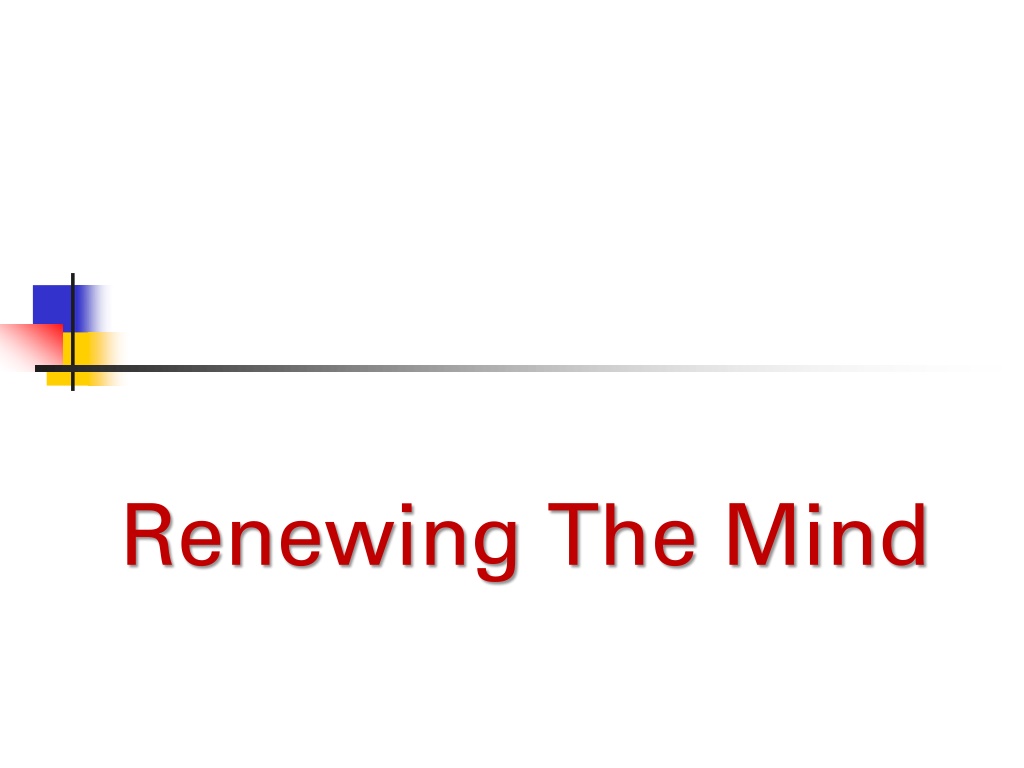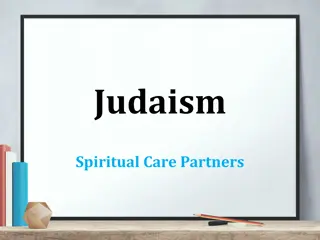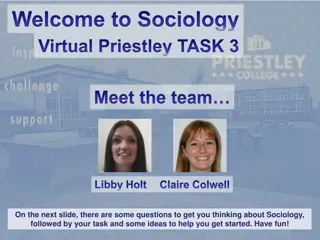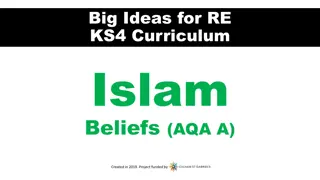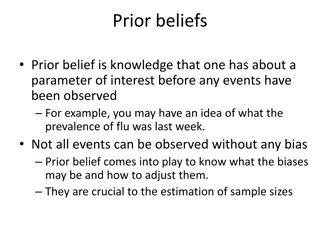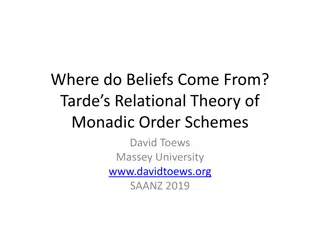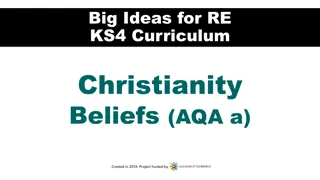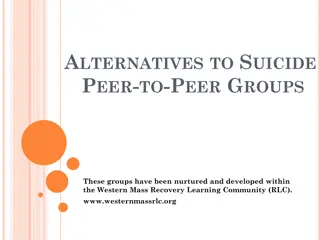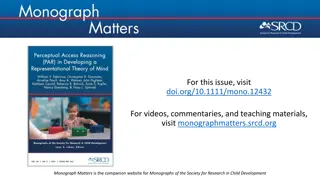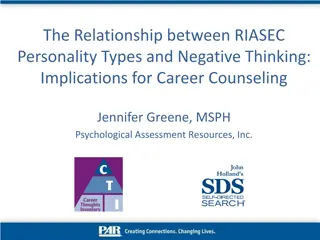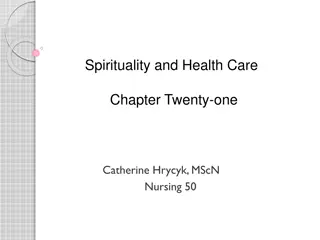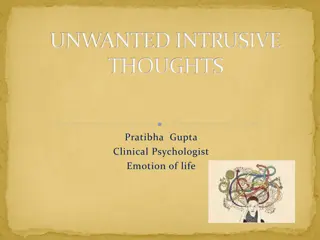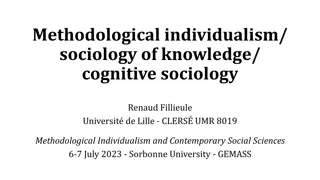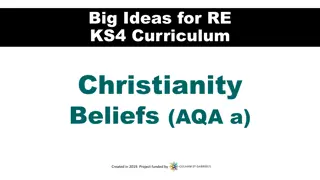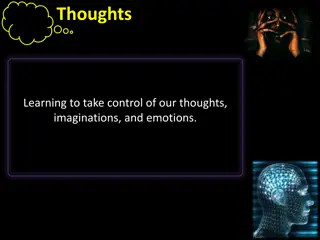Understanding the Power of Beliefs and Thoughts
Explore the profound impact of beliefs and thoughts on our internal world, behaviors, and emotions. Uncover how our inner dialogue shapes our perception and influences our beliefs about ourselves, others, and life. Delve into the significance of renewing the mind to foster a healthier belief system and a more positive outlook on life.
Download Presentation

Please find below an Image/Link to download the presentation.
The content on the website is provided AS IS for your information and personal use only. It may not be sold, licensed, or shared on other websites without obtaining consent from the author. Download presentation by click this link. If you encounter any issues during the download, it is possible that the publisher has removed the file from their server.
E N D
Presentation Transcript
Your Internal World The thoughts and intentions of the heart" are our internalized beliefs, They include formal beliefs (such as theological beliefs) And informal and more personal beliefs such as "No-one could possibly love me". These beliefs or thoughts of your heart are often reflected in what psychologists call your self-talk which is the chatter that goes on inside you as you are doing things I wish Susan would call, I bet she won t,
Our Beliefs These beliefs are our idea about what is true or untrue, possible or impossible, plausible or implausible. They contain our conclusions about life and beliefs about God, others, and ourselves. Unlike perspectives, beliefs can generally be compressed into a single sentence such as I believe that Jesus is God or I think I am totally unlovable .
Thoughts & Intents The Bible has two categories here; thoughts which is fairly much all-embracing and intentions which are the movements of the will as we plan, vow and scheme our way through life. The picture we see in Scripture is that these thoughts and beliefs, desires, vows, and inner goals are generally verbal.
Inner Talk Each thought or intent can be summed up in a single sentence. When the prophets cry out I know what you are thinking in your hearts it is X it is always a statement, a sentence that encapsulates the heart attitude. This inner talk then becomes part of an inner story that the person is weaving about their life. This framework of thoughts, intents and inner stories forms a major part of the person s belief system.
The Unrenewed Belief System Over time we weave these sentences into a sort of a bird s nest of a structure inside us that we call our world-view. For most people it is a horrific jumble of things they learned at school, life lessons, Grandma s sayings, the latest media opinions and a book they once read. This internal belief structure is more or less functional and gets people by for the seventy or so years they are on this earth. However for some people it can go horribly wrong and cause them a great deal of confusion and emotional pain.
The Heart Is Not A Pretty Place (Genesis 8:21 NKJV) Then the LORD said in His heart, "I will never again curse the ground for man's sake, although the imagination of man's heart is evil from his youth; (Jeremiah 17:9 NKJV) "The heart is deceitful above all things, And desperately wicked; Who can know it? (Ecclesiastes 9:3 NKJV) This is an evil in all that is done under the sun: that one thing happens to all. Truly the hearts of the sons of men are full of evil; madness is in their hearts while they live, and after that they go to the dead. (Mark 7:21-23 NKJV) "For from within, out of the heart of men, proceed evil thoughts, adulteries, fornications, murders, {22} "thefts, covetousness, wickedness, deceit, lewdness, an evil eye, blasphemy, pride, foolishness. {23} "All these evil things come from within and defile a man."
Cleaning Up The Mess We need more than just healing , we need repentance and cleansing. Christians have the blood of Jesus and the help of God the Holy Spirit to help them clean up the mess that is in their hearts. We need to start with some of the huge contradictions that we live with in our belief systems.
Dithering Between Two Options It is quite possible to hold conflicting beliefs or inconsistent beliefs or even two entirely different frameworks of belief. Sunday Christians are a prime example. At Church they seem to truly believe the Bible. At work they operate under an entirely different belief system and operate largely without reference to God. Both are real belief systems for them. They choose which one to operate under depending on where they are and who they are with.
YHWH vs. Baal In the Old Testament they even had two distinct religions worshipping Baal when it came to farming and fertility and Yahweh when it came to war. Dual value systems such as this have been castigated by the prophets, Jesus and the apostles from one end of the Bible to the other. From Joshua's "choose which day who you will serve" (Joshua 24:15) - - to Elijah's "how long will you falter between two opinions" (1Kings 18:21) - to Jesus and "you cannot serve God and Mammon" (Matthew 6:21- 24) - to James and his exhortations against double-mindedness and worldliness. (James 1:5-8, 4:1-7).
Tossed To And Fro. Such people have literally two belief systems and two minds - Scripture calls them "double-minded" and says that they are spiritually unstable. (James 1:5-8) This instability results from the fact that they are constantly choosing between two or more things they can believe at any one moment. One minute they choose to operate from the biblical belief, the next minute they choose to operate from greed, superstition or expediency. Up and down, tossed here and there like the waves of the sea.
Pathology Within Us In addition to having multiple belief systems people can decide to hold evil and wicked beliefs or beliefs that are illogical and insane. Some people honestly and truly believe that the entire world should be organized around their happiness. Others truly believe that they can take what they like and do what they like. A few believe that flying jet planes into buildings will give glory to God and bring them eternal life in Paradise. Yet others believe that worshipping an idol will give them spiritual power and good fortune. The birds nest of human beliefs inside us can become very toxic and result in pathological life choices.
Is It All Bad? The heart of the natural man can go badly and seriously wrong through adoption of a self-centered and toxic world-view which incorporates ungodly and illogical beliefs. This is not the total picture though. Even in the OT we find people described as being penitent in heart and having hearts set on the Lord.
The Learning Heart Christians do not necessarily believe what they think they believe. Christians are generally still learning to believe that which they think they believe. This is the difference between believing something as a notion or as a doctrine and really believing it so that it is operational for you under stress and pressure. A test of this is "How much pressure does it take before you start to doubt that which you are sure you believe?
The Panic Point. Ask yourself the following two questions: 1."If I was out in a small boat on the Sea of Galilee and the waves were high and the boat was about to sink would I be calm or would I be afraid?" Would Jesus say to me "I have not seen such great faith in all Israel" or would He say to me "Why are you afraid O ye of little faith?" 2."How low can the bank account go before I start getting anxious and doubting that God will provide? Where is the point at which I choose to panic?".
Learning To Believe The difference between the answers we put in the bible study booklet and the answer we give to the actual pressures of life can be startling. Our notional beliefs and our operational beliefs under pressure are different. This may not be due to double-mindedness but just to the need to mature, learn and grow. As committed Christians we are continually learning to truly believe that which we think we already believe. So we can see that the goal is to have a consistent and fully Christian belief system that is the sole one we operate from, and which is operating at the level of the thoughts and intentions of our heart and guiding our daily conduct and informing all our emotional responses. This belief system will fill us with joy and give us poise and calm in the middle of life's trials. It will be heart level, practical, biblical, strong and singular. Our lives will ring with faith and authenticity.
The Pure Heart Of Jesus When we look at the beliefs of Jesus we find there is no birds nest , but instead a purity and simplicity that is stunning. His thoughts were always pure and Scriptural and logical and right. Jesus is never for a single second, fearful or anxious or halting between two opinions. When the Devil offers Him all the kingdoms of the world He does not say Let me think about that for five minutes. Jesus heart was so fixed on God and so pure in its intentions that He did not hesitate or waver even under strong temptation. Jesus was pure in heart and did not sin even in His thoughts and intentions.
Blessed Are The Pure In Heart If we are to be like Jesus in all aspects then we must head towards purity of heart. At first this seems to be a long and impossible journey. Purity of thoughts and intentions seems both unsafe in a wicked world (unless we lock ourselves away in a monastery) and impractical to achieve in one lifetime. Yet the promise of Jesus in the Beatitudes is that The pure in heart will see God . (Matthew 5:8) and He seems to be calling us to the impossible journey of sorting out and cleaning up our birds nest, changing our beliefs and coming into fellowship with Him.
Scriptures On Purity of Heart (Matthew 5:8 NKJV) Blessed are the pure in heart, For they shall see God. (1 Timothy 1:5 NKJV) Now the purpose of the commandment is love from a pure heart, from a good conscience, and from sincere faith, (2 Timothy 2:22 NKJV) Flee also youthful lusts; but pursue righteousness, faith, love, peace with those who call on the Lord out of a pure heart. (Titus 1:15 NKJV) To the pure all things are pure, but to those who are defiled and unbelieving nothing is pure; but even their mind and conscience are defiled. (1 Peter 1:22 NKJV) Since you have purified your souls in obeying the truth through the Spirit in sincere love of the brethren, love one another fervently with a pure heart, (1 John 3:2-3 NKJV) Beloved, now we are children of God; and it has not yet been revealed what we shall be, but we know that when He is revealed, we shall be like Him, for we shall see Him as He is. {3} And everyone who has this hope in Him purifies himself, just as He is pure.
6 Good Reasons To Change 1. God cares about your beliefs and weighs them up. He judges the thoughts and intentions of your heart. (Romans 2:15,16; Jeremiah 11:20; Hebrews 4:12). 2. Jesus expects us to be increasing in our faith and in fact is quite demanding about it! The expectations He had of his disciples included being calm in storms (Matthew 8:26), walking on water (Matthew 14:31), believing in miraculous provision (Matthew 6:30), being able to understand parables (Matthew 16:8), and being able to cast out demons, heal the sick and raise the dead (Matthew 10:8). When they failed to do any of the above they were rebuked (Matthew 17:20). The phrase "O ye of little faith" (see the references in Matthew above) shows that the disciples were expected to learn to believe Jesus with ever-increasing faith. Jesus does not call us to have a static level of faith. Rather we are called to develop a growing "mountain-moving faith" that starts from small "mustard-seed" beginnings. (Matthew 17:20).
6 Reasons contd 3. Theology interpenetrates reality. Every belief is theological. Carl Jung used to say that every human problem after the age of 35 was spiritual in nature. In a similar vein even the small voices, the dark mutterings of the human heart and the wretched small-minded beliefs that people have are a form of rebellion against God and a dwelling in darkness. For instance to believe in your heart that the world stinks is to malign the Creator. To vow that you will always play it safe and that you will never love again is to retreat into darkness and flee the love of God that He puts into people to reach you. Thus all your beliefs have a theological component and need to brought into the light of the Word of God. 4. How we believe determines what we receive. "According to your faith be it unto you". (Matthew 9:29, 15:28). Conversely having an unstable, worldly or double-minded faith means we will receive nothing from God (James 1:5-8, 4:1-8). Faith can bring healing (Matthew 9:22, James 5:15-18) is a prerequisite for receiving wisdom from God (James 1:5-8), for daily provision and reduction of anxiety (Matthew 6:30-34) and makes all things possible (Mark 9:23).
6 Reasons contd 5. Creedal faith is insufficient. Even the demons have correct theology in the sense that they believe that God is one - and tremble (James 2:19). Thus merely creedal belief is insufficient for salvation. Belief must be authentic, loyal to God, of the heart and worked out in real life. (James chapter 2). The great men and women of God all had extraordinary personal belief systems that set them apart from their generation. (Hebrews 11) 6. Letting unbiblical and dysfunctional beliefs linger can cause them to become stronger, more dysfunctional and more painful. Working on them now may take work, but leaving them will make it much worse later on. (Proverbs 4:23 NKJV) Keep your heart with all diligence, For out of it spring the issues of life.
The Difference Every church has miserable grumpy Christians alongside radiant faith-abounding Christians. Well what's the difference between the two groups? Both miserable and faith-abounding Christians have heard exactly the same sermons and been to exactly the same bible studies and mixed with exactly the same people in exactly the same neighborhood church and can tick exactly the same boxes theologically. But only the faith-abounding Christians have taken the time and effort to make sure their inner personal beliefs line up with God's Word.
Complaining Or Believing? Grumpy cynical Christians have decided not to really believe. They would much prefer to complain. Faith-abounding Christians have decided that with God s help they will interpret reality properly and have paid attention to their heart. They have decided that they will "truly believe" and have put effort into their faith. Now they reap joy and have much more successful Christian lives.
From The Marketplace Even the secular world has discovered the benefits of working on your belief system. The Dale Carnegie / Zig Ziglar "positive- thinking" movement with its affirmations and personal motivation demonstrated the power of working on personal beliefs. It turned lousy salesmen into better salesmen. It turned unhappy, unenthusiastic people into happy enthusiastic people. It caught a fragment of the Truth (taken incidentally from the founders' familiarity with the Bible) and applied it successfully to daily life. Why were salesmen so keen to systematically adopt a new belief system? What motivated them to try? Why wasn't it left in the "too hard basket?"
Why They Changed 1. They met other people who seemed successful and who said positive thinking was the key to success. 2. These other people demonstrated an alive and enthusiastic personality they wanted to possess. 3. They compared their personality and results with that of the positive thinkers and decided to change. 4. Positive thinking made intuitive sense and the short sayings had a "ring of truth" to them. 5. The system was skillfully presented. 6. The system was simple and easy to apply. 7. Initial success was swift and this reinforced the effort required to change their beliefs.
Kingdom Application If salesmen can diligently work on their belief system in order to sell insurance then surely we can work on our belief system in order to grow in the Kingdom and become mature in Christ? Our target is more than just being happy, positive and motivated. Our goal is to have a sanctified and transformational set of beliefs that give us the emotions that make us whole Christians and empower service in the Kingdom.
7 Steps To Changed Beliefs 1. We enter into a situation where we do not function as well as we would like emotionally. 2. We reflect and ask : "What beliefs are underlying these undesirable emotions" 3. We probe further and ask: Are these beliefs true and biblical and in accord with the facts? 4. We construct new better, more factual and more biblical beliefs about that situation. 5. We reinforce those beliefs to ourselves. 6. We then re-enter the situation and test our new beliefs to see if they help us function better. 7. We look at the results scientifically and objectively and decide whether to keep the new beliefs, modify the new beliefs or to stick with the old beliefs.
Frozen In Fear Incorrect beliefs can give rise to strong negative emotions such as fear, doubt and hesitancy. These emotions can hinder or even paralyze our ability to obey God. Faith is supposed to be expressed in works which are to be done in love. Incorrect inner beliefs can make us freeze up, not do the works, and shrink from expressing love.
Good Works Good Beliefs Works are a guide to us as to whether or not our faith is truly alive, saving, living and productive. Our works indicate to the world which beliefs we hold that are strong enough for us to live by and act on. Works are a reliable guide to what we truly believe in our heart. In a sense our works are our true doctrine. Our works are the outworking of those beliefs, which we are prepared to act on, live by and stand for in daily life. Paul is very definite that we are not saved by works of the law. But he is also very definite that faith working through love (Galatians 5:6) should result in good works that God has prepared beforehand for us to do. (Ephesians 2:8-10).
Inner Conflict Inner conflict can stop us doing the good that we want to do. This inner conflict can be due to conflicting thoughts and intentions in the heart. I want to serve God vs. I must please my parents I want to be pure vs. I want to be sexy I will go to seminary vs. I will never be poor I want to forgive vs. I want justice Even childhood vows can even affect present actions.
How The Heart Works The heart runs by event time . After I grow up, then I will get married . The heart is binary on/off, and issues are either resolved or unresolved. The heart often needs a signal to tell it that an issue is now resolved or no longer current. Issues remain on until they are switched off . There is little distinction between internal events and external events. A realistic fantasy can be as real as an event. The heart works by associations and similarities. If something is like A it may elicit the same response/fear as A .
Some Examples An old embarrassing memory is just as fresh now as it was twenty years ago. (Unresolved memory) People who cannot relax often over-use words like always e.g. I must always study hard rather than I must start hard until the exams are over than I can relax . (Needs to be switched off ) A person vaguely similar to your old headmaster can still scare you. (Association) A nightmare can have physical symptoms just like a real event. (Fantasy can be as real as reality)
Intents Inner Vows An inner heart vow, couched in absolute terms, such as I will never let myself be hurt again or I will never be poor can have amazing power. They will remain current until they are switched off . They can lead us into conflict with God s will. Such vows often need to be altered or renounced. (On paper, with prayer)
Pablo Pablo the programmer has a very high IQ. He failed first year university due to personal problems. He made an inner vow I must never fail again So he has always played safe and been employed in dull government jobs that are well below his ability level. He only uses his ability around friends in contexts where he cannot fail. He cannot be convinced to complete his degree or aim for higher things. His vow has caused him to live well below his potential.
Revoking Vows Revoke Personal Vows: Revoke old vows that are now contrary to the will of God. Your promises to yourself are not as important as Christian obedience. Even do something as formal as writing the old vow on a piece of paper and writing "revoked" across it and then burning the piece of paper. Sometimes you may have to revoke a foolish vow you made to God in which case you should tell Him the reason you are revoking it and ask His forgiveness. It is for good reason that oaths and vows are banned in the New Testament (Matthew 5:33-37, James 5:12).
Never Say Never Change Absolute Language: If you say to yourself "I have always got to.." then its like fixing a mental switch in the "always on" position. You have told your mind that you have always got to do X and it will receive and record that instruction as a permanent injunction, a law of the Medes and Persians. The mind is fairly literal: It will take always to mean always and never to mean never. Words like "always", "never" "have to", "go to", "perfect" and "100%" jam our mental switches in the "on" position. With enough absolutes we feel stuck, anxious and stressed as we receive multiple simultaneous urgent instructions that we have programmed into ourselves. . It is much better to give yourself an "out" by using language like "generally I should" and reserving the absolute language for situations that are truly absolute.
Making Yourself Ill Avoid Psychosomatic Language: The repeated and emphatic-use of the language and metaphors of illness can sometimes make us ill. For instance men who often tell themselves that their wife is a "pain in the neck" tend to suffer from - you guessed it - a pain in the neck - and people who "can't stand it any more" get knee trouble! This is termed psychosomatic language, somatic metaphors or "conversion" depending on your school of thought and was first noted by Sigmund Freud. In extreme cases repeated self-talk such as "If that happened I would die.." can become like an internal vow.
Intents Games & Life Scripts Eric Berne s best-seller Games People Play and transactional analysis explore the area of the intents of the heart. People play often quite complex games with others to get a payoff . Some games are life-long and become life- scripts . Playwrights and novelists are keen observers of these games.
Awareness! Face Up To And Become Aware Of The Intentions Of Your Heart: It can be difficult for some people to admit that they are complex and full of conflicting motivations. To admit to sneaky, dishonest, crafty or manipulative intentions is not easy for Christians. Many people are completely blind to this darker side of their character. Pray and ask God to reveal the thoughts and intentions of your heart to you so that you can bring them into the light and deal with them.
List Your Intentions List The Various Conflicting Intentions: This is sometimes all that is needed. For instance a teenager may find that he has two intentions: 1. To be on fire for God and a powerful witness for Jesus . 2. To still be popular with the cool, tough, non-Christians he knows. He can then work out what to do and resolve the tension. Perhaps he needs to accept that following Christ has a cost at times. Simply listing the various intentions of our heart then judging them biblically may be enough to resolve the dilemma.
Evil Intentions Confess Them to God: Confess your wrong motives and intentions to God and ask His forgiveness and cleansing. Make No Provision For Evil Intentions: Do not give yourself the means of carrying out your wrong intentions. Deny them what they need if they are to be implemented. If your wrong intention in your heart is murder - don't buy a gun. If the wrong intention in your heart is adultery - don't rent a hotel room. If the wrong intention is stealing from the church offering, make sure someone is with you when you count the money. This principle is what helped Augustine give up his loose living and become a Christian..
Make No Provision. (Romans 13:12-14 NASB) The night is almost gone, and the day is at hand. Let us therefore lay aside the deeds of darkness and put on the armor of light. {13} Let us behave properly as in the day, not in carousing and drunkenness, not in sexual promiscuity and sensuality, not in strife and jealousy. {14} But put on the Lord Jesus Christ, and make no provision for the flesh in regard to its lusts.
Inner Resistance By externalizing our beliefs and intentions we sometimes can get a handle on them and deal with them. This is often the real benefit of those management exercises such as setting priorities and doing mission statements. On a personal level if you start setting goals and priorities and coming up with a personal mission statement you will often run into awkward uncomfortable feelings of resistance. When you do get them try and identify them, and write the feelings of resistance beside the goal or priority. Bring the conflict to the surface and into the open.
Use Event Time When Planning Prioritize and Schedule Good Intentions Using Event Time: Sometimes the inner paralysis comes from a whole host of good intentions all wanting urgent attention at once. The resulting overload, confusion and stress can be stop us getting much done at all. Use the event time of the subconscious to prioritize them. First I will do A, then, after that's done I'll pay attention to B, then when that's completed to C and D. Jesus gives nearly all His instructions in event time "after you have" "when they" "wait in Jerusalem until" etc. Write all your tasks down on a sheet of paper and then group them first these, then after those then these here etc. Though the tasks are not done yet the issue of their urgency is resolved in terms your sub-conscious mind can understand and you will feel more at peace.
Solution-Focused The only way to fix a problem is to find a solution and to implement the solution in real time in the real world Reality only changes when you act upon it in an organized and definite way. All the ideas in the world will not move a single molecule! Thinking, analyzing and worrying do not change anything. Our beliefs must align with reality in constructive ways that help us to align with and then work upon reality. We must be solution-focused not problem-focused Faith sees the solution not the problem (12 spies)
Positive, Specific, & Concrete Frame Thoughts and Intentions Concretely And Positively: When you rework your thoughts and intentions it helps if they develop into a concrete specific picture of a positive desirable future. For instance a struggling student should frame the goal I will pass in Mathematics rather than I will not fail in Mathematics . When we see the biblical healing commands they are faith-filled, positive and have the desired end state in view. E.g. Peace be still , Lazarus come forth , Be made clean , or Rise up and walk . We need to be solution-focused not problem focused. The positive end result is what is to be put before the eyes of our heart. Use CONCRETE terms: They will beat their swords into ploughshares has more power in our being than weapons will be recycled into agricultural implements . When we state our goals and beliefs in concrete, positive, picture terms we seem to lay hold of them much more effectively.
Plausibility Structures Plausibility Structures : Our beliefs about what is possible and impossible, probable and improbable, plausible and implausible. Peter Berger calls these plausibility structures . Christians need to reworking their idea of limits so that they line up with Scripture s view of what is possible and impossible, plausible and implausible. Jesus says nine times in the gospels nothing is impossible with God or all things are possible with God . His life and miracles reflect His commitment to this belief. The limits we place on our life are often really limits we have placed on God through having plausibility structures which are inherited from the world rather than from the Scriptures
Checklist Identify a wrong belief that is causing you emotional pain Change it to a more biblical belief & reinforce this change Revoke wrong vows and intentions Resolve conflicts within your beliefs Don t overload your brain plan calmly using event time Be solution-focused Make positive specific plans which are full of faith Believe that God can do all things on your behalf
The Role Of The Mind (Romans 8:4-6 NKJV) that the righteous requirement of the law might be fulfilled in us who do not walk according to the flesh but according to the Spirit. {5} For those who live according to the flesh set their minds on the things of the flesh, but those who live according to the Spirit, the things of the Spirit. {6} For to be carnally minded is death, but to be spiritually minded is life and peace. The decisive factor in Biblical EQ is the Mind of the believer. If it is set on the flesh and we are carnally minded the result is death. If it is set on the Spirit and we are spiritually minded the result is life and peace. Chapter after chapter of Biblical EQ has demonstrated the truth of those two statements in Romans.
